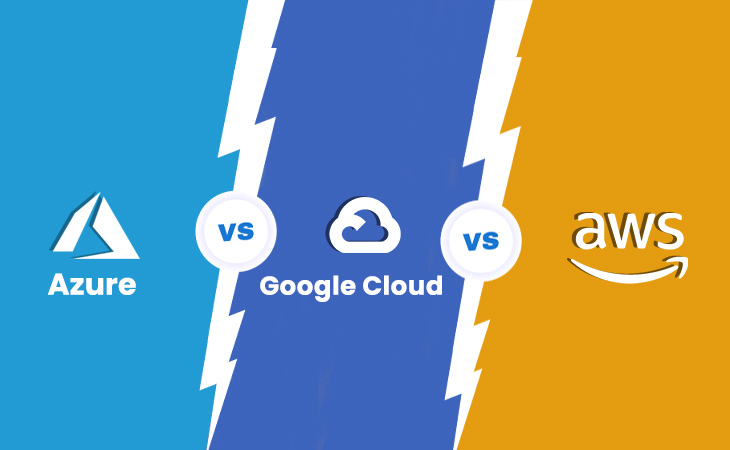-

AWS, Azure, and GCP: 4 Major Differences You Should Know
If you look at the "Big Three" public clouds today — Amazon Web Services, Microsoft Azure, and Google Cloud Platform — you'll notice that they look pretty alike. They all offer the same core sets of services. Their prices and billing models are about the same. They target the same groups of customers. And so on.
But that doesn't mean the public clouds are entirely identical. Certain areas remain where there are still important functional differences between AWS, Azure, and GCP.
This article explores four domains where one Big Three cloud provider stands apart from the others — and what the differences say about the future of the cloud computing market.
1. AI-Assisted Coding in the Cloud
All major public clouds offer IDE tools or plugins to help developers write code manually. But so far, only one Big Three cloud offers an AI-assisted software development tool, which uses AI models to help developers generate code automatically.
That cloud is AWS, and that tool is CodeWhisperer, which AWS introduced in 2022.
AWSAmazon CodeWhisperer code
Amazon CodeWhisperer provides AI-powered code recommendations to developers that can enable more efficient connections to cloud resources.
Microsoft, of course, offers Copilot, which is similar to CodeWhisperer in many ways. But Copilot is part of GitHub, not the Azure cloud. It doesn't integrate in any special ways with Azure or cater to Azure-related development needs.
For its part, GCP — and Google in general — has not yet made a major commitment to AI-assisted development products.
This suggests that AWS has an early lead in the AI-assisted coding market. Microsoft may eventually find a way to leverage Copilot within Azure. I'd be surprised if Google doesn't launch some AI-assisted development tool soon. But for now, AWS stands apart in this domain.
2. PaaS Offerings on AWS vs. Azure vs. GCP
All of the Big Three clouds offer some version of the platform as a service (PaaS), a cloud computing model in which vendors integrate infrastructure-as-a-service (IaaS) services with software development and deployment tools to provide a platform where businesses can build and run applications.
However, Azure arguably stands out for offering a complete set of PaaS solutions through services like Web App Service. AWS provides services like Elastic Beanstalk, and GCP has Cloud Run. But these PaaS-like services don't offer the same breadth or depth as Azure's PaaS offerings in terms of the range of use cases they support or the flexibility they give developers regarding how their apps are built and run.
If you want a public cloud that offers not just IaaS but also a robust set of PaaS services, Azure is the most obvious choice currently.
3. Cloud DLP Services
Cloud Data Loss Prevention or DLP, solutions help businesses find and protect sensitive data they store in the cloud.
AWS, Azure, and GCP all offer some form of DLP. But Azure's offering is based on a Microsoft product that doesn't focus on protecting data in Azure specifically, so it's not a cloud DLP service. It's a generic DLP tool that happens to support Azure.
In contrast, AWS offers Macie, and GCP provides a native DLP platform, both of which are cloud-first DLP services.
4. Hybrid Cloud Solutions
You can integrate private and public cloud infrastructure to build a hybrid cloud using AWS, Azure, and GCP. However, the way you create and manage the integrations varies.
On GCP, you'd rely on Anthos, a Kubernetes-based platform, for creating and managing hybrid clouds. That makes GCP different from AWS and Azure, whose primary hybrid cloud solutions (Outposts in the case of AWS and Arc and Stack on Azure) are not Kubernetes-based and which don't require as much Kubernetes expertise to use.
There are also differences between the clouds with regard to how flexible their hybrid cloud offerings are. AWS Outposts is more restrictive because it requires customers to purchase hardware directly from AWS, whereas Anthos and Azure Arc can support virtually any hybrid cloud infrastructure.
Conclusion
In short, although AWS, Azure, and GCP are comparable in most respects, they differ from each other regarding AI-assisted coding tools, PaaS services, cloud DLP solutions, and hybrid cloud frameworks. Each of the Big Three clouds offers some solution in most of these categories, but their solutions are not equally robust or flexible.
If you're choosing a public cloud platform, don't obsess over the small differences between the clouds in areas like hosted VMs or data storage. All the clouds are pretty much the same in those respects. Instead, focus on the more niche services described above, where the real differences between clouds shine through.
Follow Us on LinkedInAbout the Author

Kamal Rastogi is a serial IT entrepreneur with 25 yrs plus experience. Currently his focus area is Data Science business, ERP Consulting, IT Staffing and Experttal.com (Fastest growing US based platform to hire verified / Risk Compliant Expert IT resources from talent rich countries like India, Romania, Philippines etc...directly). His firms service clients like KPMG, Deloitte, EnY, Samsung, Wipro, NCR Corporation etc in India and USA.